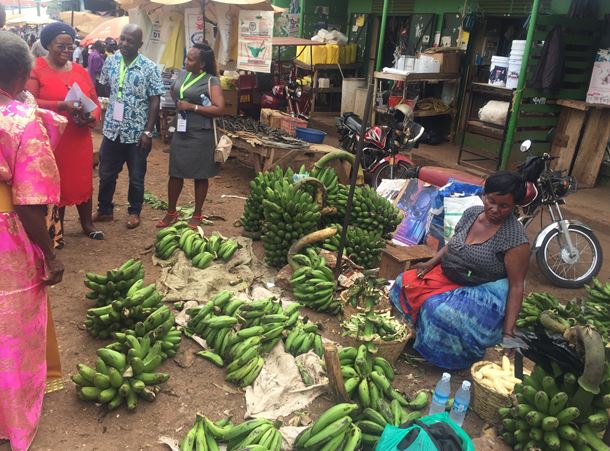The only market where knowledge exchange is part customer experience
What differentiates African food markets from the rest is that they do not just sell commodities but educate consumers. Where the majority of workers in formal markets like supermarkets focus only on selling commodities, traders in African food markets are always ready to educate consumers on different ways of preparing food. Farmers also obtain knowledge on new crops being grown by their peers in other regions. Such knowledge can only be consolidated and shared in the market.

Diverse knowledge sharing pathways
While lack of experience has remained a structural barrier for young people to be employed in the formal sector including food supply chains, African food mass food markets are increasingly accommodating millions of young men and women who would otherwise have nothing to do. These young people are bringing creativity and innovation in markets including smart packaging and use of digital solutions to smoothen trading of food commodities.
More than 20 knowledge exchange pathways can be identified in every African mass food market and these include the following: (1) Farmer to Farmer; (2) Farmer to Trader; (3) Trader to Farmer; (4) Farmer to Consumer or End-User; (5) Trader to Consumer or End-user; (6) Consumer to Consumer; (7) Farmer to Transporter; (8) Transporter to Farmer; (9) Transporter to Transporter; (10) Trader to Transporter; (11) Transporter to Trader; (12) Transporter to Consumer; (13) Consumer to Transporter; and, (14) Consumer to Farmer. This knowledge ecosystem is different from the supply-driven and student-teacher extension model which some African governments are still clinging onto.
The above knowledge exchange ecosystem is also different from what happens in the so-called formal economy where companies in the same line of business do not share knowledge to a point where one is doing well while the other is folding up. Such secretive and individualistic knowledge practices explain why in most African countries, mass food markets and SMEs are growing while formal companies are collapsing. In mass food markets, knowledge is often repaid with knowledge. Everyone learns from others resulting in a rich knowledge ecosystem which does not only involve monetary compensation or formal training. However, lack of documentation is a significant impediment to much of the information, knowledge, and experience being shared and utilized among market actors. Documentation will assist in consolidating lessons learned into best practices for future generations of mass food market actors.
The power of personalization
Traders in African mass food markets are masters in providing personal experience to customers and consumers. They take their time to build strong personal relationships with particular clients whom they supply food items as agreed. This is very important because there is an increase in the number of customers with a sustainability mindset and keen to know where their food is coming from and how it is produced. Global supply chains can effectively answer these personalization-driven needs.
With increasing climate change, many people are turning to mass markets for food because droughts are making it impossible for them to meet all their food requirements. This means the market is no longer just a source of food but also a source of knowledge on diverse foods which most consumers did not grow up eating. Fulfilling food requirements is becoming more complex as many people want to learn about new food. For instance, consumers in dry regions who did not grow up eating yams are now developing new tastes for such food.
Cultivating such tastes may not be the domain of traditional extension officers who have become more like salespersons for monocropping and industrial agriculture. It is the domain of markets and traders who specialize in tubers and yams. These traders have acquired unique skills in personalizing their services and approaches toward fulfilling orders including providing discounts line with each consumer’s buying power. Among the actors who are adept at understanding and personalizing consumer tastes and priorities are vendors who buy from mass markets for resell in urban residential areas. These can tell you how the COVID19 pandemic has reshaped customer behaviour as well as the shift in demand for different food categories. For instance, they have seen how some fruits and vegetables have moved from being necessities to luxuries.
Vendors also know how seasonality affects consumer behaviour with some commodities and demand patterns associated with festive seasons like Christmas and end of year parties. These are issues very few farmers and extension officers know. For consumers who value sustainability in terms of how food is produced and provided in the market, traders and vendors are in a better position to cater to these consumers by providing a clear alternative to formal businesses and markets whose business model is built on scale and sourcing commodities at the lowest cost, at the disadvantage of smallholder producers.
By being open to all including the most vulnerable like widows, those living with disability and some chronic diseases, African mass food markets are able to tap into unique values and knowledge such as the extent to which food can be used as medicine. In fact, trading in mass food markets has become the last livelihood opportunity for the most disadvantaged and vulnerable members of African communities.
Potential for e-commerce
Due to digital illiteracy and the speed of transactions in mass food markets, very few traders are finding time and ways to translate their distinctive attributes to e-commerce or online settings. A number of young traders are finding creative ways of combining being local customer-centric with working effectively with large institutional buyers like processors and wholesalers. Large institutional buyers are a key avenue for acquiring and mastering new business to business knowledge as well as developing managerial accounting which helps in new relationships beyond local markets. Besides stabilizing markets, institutional buyer are sources of knowledgeable recommendations on how e-commerce can be embedded in the trading of food commodities because they work closely with formal banks.
charles@knowledgetransafrica.com / charles@emkambo.co.zw / info@knowledgetransafrica.com
Website: www.emkambo.co.zw / www.knowledgetransafrica.com
Mobile: 0772 137 717/ 0774 430 309/ 0712 737 430
